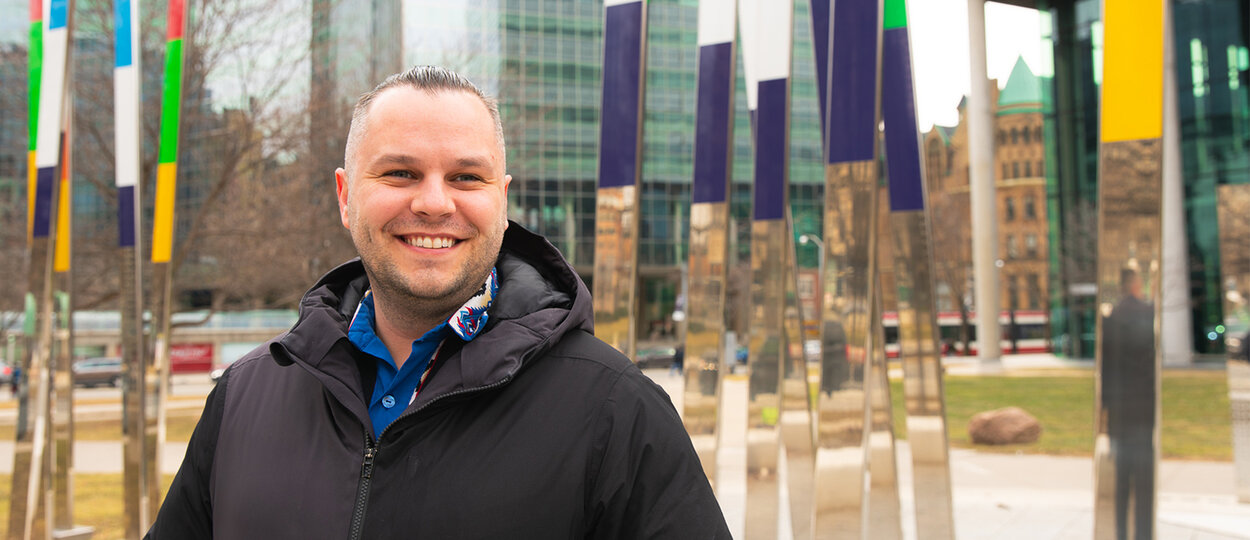Jaris Swidrovich leads research to document experiences of Two Spirit peoples in community pharmacy and build awareness across pharmacy profession
While awareness is growing among pharmacy professionals about sexual and gender diversity and how to better care for diverse patients, some – specifically Two Spirit peoples – are often left behind. Yet, pharmacists have an important opportunity to lead the way in providing high-quality, inclusive care and to create opportunities for Two Spirit peoples to have positive and supportive interactions with the health care system.
“My goals are to increase the visibility of Two Spirit peoples in the pharmacy community and help pharmacy professionals understand the history and current realities of Two Spirit peoples to provide the best possible care.”
“Two Spirit peoples seem to be missing from many of these conversations and research, likely because of the intersectionality with Indigeneity,” says Dr. Jaris Swidrovich, Assistant Professor, Teaching Stream at U of T’s Leslie Dan Faculty of Pharmacy and a Two Spirit Saulteaux First Nations man from Yellow Quill First Nation. “My goals are to increase the visibility of Two Spirit peoples in the pharmacy community and help pharmacy professionals understand the history and current realities of Two Spirit peoples to provide the best possible care.”
Swidrovich is a clinical pharmacist and a recognized leader in decolonizing and Indigenizing pharmacy education and practice. With CIHR funding, he is leading a first-of-its-kind study to document the experiences of Two Spirit peoples in community pharmacies with the goal of increasing pharmacists’ awareness and understanding and improving care.
Two Spirit is an identity specific to Indigenous Peoples who carry both masculine and feminine spirits. Many Indigenous nations have their own words for people whose gender is not captured by a colonial gender binary, and historically, these people have held important spiritual and cultural roles in their communities. Two Spirit is a relatively new term, adopted in the early 1990s, that serves as an umbrella term for gender fluid or non-conforming Indigenous peoples, but it is also meant to reflect Two Spirit peoples’ cultural and spiritual significance, not only their gender identity or sexual orientation.
Within the health care system, Two Spirit peoples often face challenges in receiving high quality care, from a lack of access to culturally sensitive care to anti-Indigenous racism, as well as sexism, homophobia or transphobia, depending on their gender identity and expression. Some research has started to examine the experiences of Two Spirit peoples in the broader health care system, but not within the community pharmacy setting.
“Each of the identities of Two Spirit peoples – being Indigenous and their sexual and gender diversity – have a history and ongoing process of inequities, mistreatment or substandard treatment,” says Swidrovich. “All of those identities intersect so they can and do come into play at once, and the effect can be compounded such that they can face a lot of discrimination.”
Two Spirit peoples need to be part of “leading the change”
The accessibility of community pharmacists gives them an opportunity to make an impact in improving care for Two Spirit peoples, if they have the appropriate education and experience.
Swidrovich’s CIHR grant is a first step in creating more awareness and understanding of Two Spirit peoples among the pharmacy community. He is leading a team, which includes queer members, that is hosting sharing circles with Two Spirit peoples across the country to listen to and document their experiences related to community pharmacies. The research team is working with community-trusted organizations in each location to recruit participants, and they also plan to have an Elder, specifically a Two Spirit Elder where possible, present at each sharing circle.
The sharing circles had been delayed during the COVID-19 pandemic but are starting to get underway this year. At the first virtual event held in February participants relayed stories of racism, heteronormativity and homophobia that have affected their care in community pharmacies.
“We have a country and a health care system that is built on cis-hetero models, and homophobia, transphobia and racism are so present within these systems,” says Marissa Pirlot, a master’s student in pharmacy at the University of Saskatchewan working on the project with Swidrovich. “If we can help pharmacists understand these identities and start to normalize them, hopefully we can improve the health and wellbeing of these groups that are being discriminated against.”
“It’s important to have those Two Spirit voices be the ones leading the change because they are the ones who know what is going to work best for them.”
Once the sharing circles are complete, the research team plans to share these experiences with pharmacists through presentations and publications to increase visibility and awareness of the Two Spirit community among pharmacy professionals and improve the care they provide. Eventually, the research could lead to community-based projects and programs in pharmacies created by and for Two Spirit peoples.
“It’s important to have those Two Spirit voices be the ones leading the change because they are the ones who know what is going to work best for them,” adds Pirlot.
Swidrovich says pharmacy students and practicing pharmacists need more Two Spirit–led education, as well as practical experience working with Two Spirit patients to build the skills needed to provide high-quality care, such as practicing appropriate language, pronouns, and cultural sensitivities.
“When Two Spirit education is either not offered at all or is just a part of a one-hour guest lecture and there is no skills-based training, we’re not setting students up to provide the best possible care to Two Spirit peoples,” he says. “As we move forward in our inclusivity journey in pharmacy, it’s important that Two Spirit peoples aren’t left out.”
Additional Resources:
U of T Libraries: Two Spirit and LGBTQIA Indigenous Resources
More News
Image

Dean Lisa Dolovich reappointed for second term
Professor Lisa Dolovich has been reappointed for a second term as Dean of the Leslie Dan Faculty of Pharmacy, University of Toronto, effective July 1, 2025, to December 30, 2030.
Read More
Image

Pharmacy Summer Camp gives high school students insight into pharmacy profession
A new summer camp based at the faculty will give high school students a range of experiences in pharmacy and pharmaceutical sciences.
Read More
Image

Team GloveLift wins 2025 Business Plan Competition with innovative medical device
PharmD students win $5,000 prize for their innovative medical device concept aimed at improving patient care.
Read More


